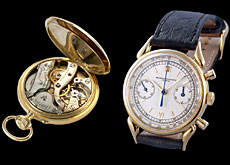
Vacheron Constantin ticks over 250 years

Watchmaking company Vacheron Constantin is this year celebrating a quarter of a millennium of producing some of the world's most prestigious timepieces.
Respected as one of the top addresses in horology, the Geneva company is looking back on a rich history of tradition and quality. But it is determined not to rest on its laurels.
A tour around the state-of-the-art centre on the outskirts of Geneva reveals a world of wonder.
This is where master watchmakers put together the most complicated of watches that will more than likely gain in value as time goes by.
“History has a big value. It is the roots of a man or woman and a company. Roots are very essential but you never see the roots. You see the leaves of the tree,” explains a philosophical CEO Claude-Daniel Proellochs.
Tradition
For him, it is essential that the company maintain its tradition of handing down know-how from one generation of master watchmakers to the next.
“It’s essential to have a strong past to build up the future but we don’t have to be nostalgic and look to the past and not act today for tomorrow,” he told swissinfo.
Three people were instrumental in ensuring the company’s success.
One was Jean-Marc Vacheron, who opened his watchmaking shop in the Saint-Gervais district of Geneva in 1755.
He was not only a watchmaker but also a man of letters, a historian, a mathematician and a close friend of the philosopher Jean-Jacques Rousseau and the writer Voltaire.
François Constantin added his name to the brand in 1819. Considered an adventurer, he travelled widely outside Switzerland, opening up many markets to the company.
Always possible
He gave the company its credo, which is considered as valid today as it was when he coined it: “Do better if possible, and it’s always possible.”
The third pillar in the ascendancy of the company was Georges-Auguste Leschot, who came in 1839. Proellochs believes he was an “incredible technical inventor”.
“At that time everybody was making everything completely by hand. You couldn’t make two watches the same.”
“He adapted the pantograph to watchmaking, and so could reproduce exactly the same components. This gave a big boost to the brand in the middle of the 19th century in which communications and industry were developing.”
Although the company headquarters are spacious and are decorated in a manner that befits such a prestigious brand, Proellochs is well aware that there are many definitions of luxury.
Not pompous
Luxury, he maintains, must not be pompous but rather something that is out of the ordinary for the person concerned.
“If you buy a Swatch and you live in Africa, it’s superb luxury. It’s may be more than your monthly average wage. Luxury should be something extraordinary but never something arrogant,” he says.
Putting together a Vacheron Constantin watch has to combine three elements in “perfect harmony”. These are design that does not come and go with fashion, master technology and hand finishing.
Ethics also plays a part in the company’s thinking. Proellochs, who is shortly to retire, has much respect for other notable brands nearby but also Swatch, which he describes as a “very serious product… made with a lot of good technical and marketing elements”.
“I think we don’t have to beat the competition. We have to beat ourselves, which is much more difficult and requires much more discipline,” he says.
Exclusive quality
He is realistic when asked about maintaining the company’s exclusive quality when producing only about 15,000 watches a year.
“It’s an everyday fight and that’s not a joke. Fighting for quality in a small series is really a challenge. Don’t forget that at the top end, the demands of the customer are higher and higher, so you have to adapt to what they want,” he said.
The company is discreet when it comes to its notable customers. Publishing the names of the rich and famous is just not part of the company philosophy.
Although the 250th anniversary is a thank you to its clients and a testimonial, Vacheron Constantin has come out with masterpieces for the occasion.
Proellochs also wants to use the jubilee not as a point of arrival but of departure.
His vision for the next quarter of a millennium is to stay selective, stay distinctive and remain original, not imitating others.
“The vision is to surprise our customers and to bring products which are really linked to their expectations – or even better,” he explains.
swissinfo, Robert Brookes in Plan-les-Ouates, Geneva
Vacheron Constantin is the world’s oldest watchmaker in uninterrupted activity since 1755.
It opened its new facility just outside Geneva in 2004. With a museum and the historical flagship boutique in the heart of the city, Vacheron Constantin has had a continuous presence on the Quai de l’Ile for over 130 years.
The company has a research and development facility in the Vallée de Joux, where it also makes components for watch movements.
It is now part of the Richemont group but was previously owned (1986-96) by former Saudi oil minister Sheikh Yamani.
More than SFr18 million ($13.86 million) was achieved in April at an auction of 250 Vacheron Constantin timepieces in Geneva.
The King Fouad I pocket watch sold for a record SFr3.3 million, making it the most sought-after Vacheron Constantin pocket watch and the fifth most sought-after pocket watch in the world.
The Swiss colony in Egypt originally presented it to King Fouad I in July 1929 to mark his visit to Switzerland.

In compliance with the JTI standards
More: SWI swissinfo.ch certified by the Journalism Trust Initiative




























You can find an overview of ongoing debates with our journalists here . Please join us!
If you want to start a conversation about a topic raised in this article or want to report factual errors, email us at english@swissinfo.ch.